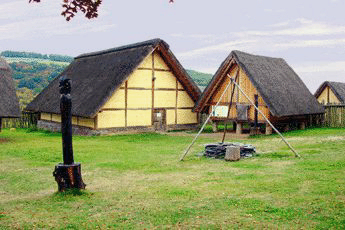Our website is made possible by displaying online advertisements to our visitors.
Please consider supporting us by disabling your ad blocker.
Treveri

The Treveri (Gaulish: *Treweroi) were a Germanic or Celtic[1] tribe of the Belgae group who inhabited the lower valley of the Moselle in modern day Germany from around 150 BCE, if not earlier,[2] until their displacement by the Franks.[3] Their domain lay within the southern fringes of the Silva Arduenna (Ardennes Forest), a part of the vast Silva Carbonaria, in what are now Luxembourg, southeastern Belgium and western Germany;[4] its centre was the city of Trier (Augusta Treverorum), to which the Treveri give their name.[5] Celtic in language,[6] according to Tacitus they claimed Germanic descent.[7] They contained both Gallic and Germanic influences.[8]
Although early adopters of Roman material culture,[9] the Treveri had a chequered relationship with Roman power. Their leader Indutiomarus led them in revolt against Julius Caesar during the Gallic Wars;[10] much later, they played a key role in the Gaulish revolt during the Year of the Four Emperors.[11] On the other hand, the Treveri supplied the Roman army with some of its most famous cavalry,[10] and the city of Augusta Treverorum was home for a time to the family of Germanicus, including the future emperor Gaius (Caligula).[12] During the Crisis of the Third Century, the territory of the Treveri was overrun by Germanic Alamanni and Franks[13] and later formed part of the Gallic Empire.

Under Constantine and his 4th-century successors, Augusta Treverorum became a large, favoured, rich and influential city that served as one of the capitals of the Roman Empire (together with Nicomedia (present-day İzmit, Turkey), Eboracum (present-day York, England),[citation needed] Mediolanum (present-day Milan, Italy) and Sirmium).[14] During this period, Christianity began to succeed the imperial cult and the worship of Roman and Celtic deities as the favoured religion of the city. Such Christian luminaries as Ambrose, Jerome, Martin of Tours and Athanasius of Alexandria spent time in Augusta Treverorum.[15]
Among the surviving legacies of the ancient Treveri are Moselle wine from Luxembourg and Germany (introduced during Roman times)[16] and the many Roman monuments of Trier and its surroundings, including neighbouring Luxembourg.[17]
Three Roman roads, very important for their role in transregional trade and military deployment capability, went through the territory of the Treveri:
- the first came from the south, connected Divodurum (Metz, France) and Ricciacus (Dalheim, Luxembourg) with Augusta Treverorum (Trier, Germany) and went further to the Rhine river in the northeast, the border of the Roman Empire
- the second came from the southwest and connected Durocortorum (Reims, France) with Andethana (Niederanven, Luxembourg) and Augusta Treverorum
- the third went through the Ardennes in present-day Belgium and Luxembourg and connected Durocortorum to the major city and garrison of Colonia Agrippinensis (Cologne/Köln, Germany) on the Rhine river.[18]
- ^ Drinkwater, John Frederick (2012). "Treveri". In Hornblower, Simon; Spawforth, Antony; Eidinow, Esther (eds.). The Oxford Classical Dictionary (4 ed.). Oxford University Press. ISBN 9780191735257. Retrieved January 26, 2020.
Treveri, a Celtic people in the Moselle basin
- ^ Metzler (2003), p. 35.
- ^ Wightman (1970), pp. 250–253.
- ^ Wightman (1970), pp. 21–23.
- ^ Wightman (1970), p. 37.
- ^ Wightman (1970), p. 19.
- ^ Tacitus writes, "The Treveri and Nervii are even eager in their claims of a German origin, thinking that the glory of this descent distinguishes them from the uniform level of Gallic effeminacy." Germania XXVIII.
- ^ Waldman, Carl; Mason, Catherine (2006). Encyclopedia of European Peoples. Infobase Publishing. p. 802. ISBN 1438129181.
- ^ Woolf (1998), p. 21.
- ^ a b Caesar, de Bello Gallico.
- ^ Tacitus, Histories.
- ^ Tacitus, Annales I:40–41.
- ^ Metzler (2003), p. 62.
- ^ Wightman (1970), p. 110.
- ^ Cite error: The named reference
Zahnwas invoked but never defined (see the help page). - ^ Wightman (1970), p. 189.
- ^ Jullian (1892), p. 296, remarks, "Seeing all these ruins, still superb today, one senses the supreme effort of the Roman world at the gates of barbarism" (A voir aujourd’hui toutes ces ruines encore superbes, on sent le suprême effort du monde romain à la porte de la barbarie).
- ^ Thill (1973), pp. 77–78.
Previous Page Next Page


